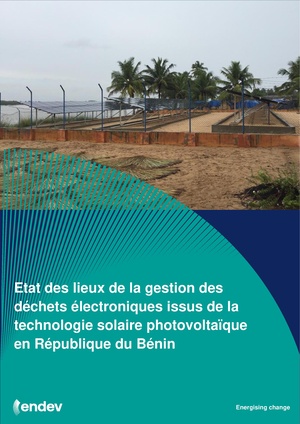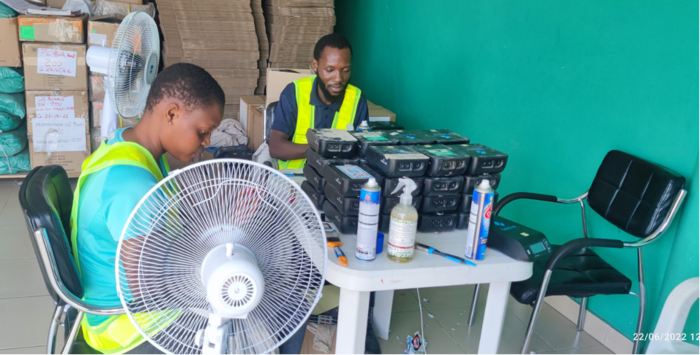Difference between revisions of "EN/EnDev Benin/Solar Energy/Publications"
***** (***** | *****) m Tag: 2017 source edit |
***** (***** | *****) m Tag: 2017 source edit |
||
| Line 23: | Line 23: | ||
In Benin, solar photovoltaic capacity is set to increase considerably under the ''National Policy for the Development of Renewable Energies'' (known as [https://direction-energie.gouv.bj/documents/politique-nationale-de-developpement-des-energies-renouvelables-2020.html PONADER]). However, given the limited lifespan of photovoltaic components, safe end-of-life management is needed to ensure sustainability (contributing to SDGs 3, 7, 11 and 13) and avoid negative impacts on the environment and human health. EnDev is therefore supporting the Ministry of Energy in drawing up a national strategy for the management of photovoltaic e-waste. The support consists of three key stages. | In Benin, solar photovoltaic capacity is set to increase considerably under the ''National Policy for the Development of Renewable Energies'' (known as [https://direction-energie.gouv.bj/documents/politique-nationale-de-developpement-des-energies-renouvelables-2020.html PONADER]). However, given the limited lifespan of photovoltaic components, safe end-of-life management is needed to ensure sustainability (contributing to SDGs 3, 7, 11 and 13) and avoid negative impacts on the environment and human health. EnDev is therefore supporting the Ministry of Energy in drawing up a national strategy for the management of photovoltaic e-waste. The support consists of three key stages. | ||
| − | + | *A country-wide baseline study and an analysis of international experience: | |
A baseline study conducted with the support of [https://www.oeko.de/en/ Öko-Institut] has shown that there are growing volumes of imports of photovoltaic products and the resulting e-waste in Benin. While solar companies can repair and reuse components from faulty equipment, the absence of official recyclers and a regulatory framework means that end-of-life equipment is simply stored or abandoned in the wild by users. This situation favors the informal e-waste sector, which offers cheap solutions with no regard for the impact on health or the environment. Stakeholders therefore agreed on the urgent need for action to ensure safer management of this waste stream. | A baseline study conducted with the support of [https://www.oeko.de/en/ Öko-Institut] has shown that there are growing volumes of imports of photovoltaic products and the resulting e-waste in Benin. While solar companies can repair and reuse components from faulty equipment, the absence of official recyclers and a regulatory framework means that end-of-life equipment is simply stored or abandoned in the wild by users. This situation favors the informal e-waste sector, which offers cheap solutions with no regard for the impact on health or the environment. Stakeholders therefore agreed on the urgent need for action to ensure safer management of this waste stream. | ||
| − | + | *Development of a national strategy for the management of photovoltaic electronic waste: | |
Based on the baseline study, EnDev is currently supporting the Ministry of Energy in drawing up a national strategy for the management of electronic waste from photovoltaic solar energy. The design of this strategy involves all stakeholders and includes technical, organizational and regulatory specifications for the rational management of end-of-life photovoltaic equipment. | Based on the baseline study, EnDev is currently supporting the Ministry of Energy in drawing up a national strategy for the management of electronic waste from photovoltaic solar energy. The design of this strategy involves all stakeholders and includes technical, organizational and regulatory specifications for the rational management of end-of-life photovoltaic equipment. | ||
| − | + | *Implementation of pilot projects: | |
In order to test and improve the feasibility of the national strategy, pilot activities will be implemented to support the private sector in collecting and recycling volumes of photovoltaic e-waste, based on the principle of extended producer responsibility (EPR), as well as to support innovative ideas and awareness-raising. These pilot projects will be financed by the European Union. | In order to test and improve the feasibility of the national strategy, pilot activities will be implemented to support the private sector in collecting and recycling volumes of photovoltaic e-waste, based on the principle of extended producer responsibility (EPR), as well as to support innovative ideas and awareness-raising. These pilot projects will be financed by the European Union. | ||
Revision as of 11:05, 5 March 2024
E-waste management: EnDev's pioneering work in Benin
EnDev is supporting the development of a national plan for the management of photovoltaic (PV) electronic waste in Benin. To this end, EnDev is implementing pilot projects for the collection and recycling of solar PV e-waste, thanks to co-financing from the EU. The aim is to effectively engage and strengthen the private sector to develop the PV e-waste value chain.
In Benin, solar photovoltaic capacity is set to increase considerably under the National Policy for the Development of Renewable Energies (known as PONADER). However, given the limited lifespan of photovoltaic components, safe end-of-life management is needed to ensure sustainability (contributing to SDGs 3, 7, 11 and 13) and avoid negative impacts on the environment and human health. EnDev is therefore supporting the Ministry of Energy in drawing up a national strategy for the management of photovoltaic e-waste. The support consists of three key stages.
- A country-wide baseline study and an analysis of international experience:
A baseline study conducted with the support of Öko-Institut has shown that there are growing volumes of imports of photovoltaic products and the resulting e-waste in Benin. While solar companies can repair and reuse components from faulty equipment, the absence of official recyclers and a regulatory framework means that end-of-life equipment is simply stored or abandoned in the wild by users. This situation favors the informal e-waste sector, which offers cheap solutions with no regard for the impact on health or the environment. Stakeholders therefore agreed on the urgent need for action to ensure safer management of this waste stream.
- Development of a national strategy for the management of photovoltaic electronic waste:
Based on the baseline study, EnDev is currently supporting the Ministry of Energy in drawing up a national strategy for the management of electronic waste from photovoltaic solar energy. The design of this strategy involves all stakeholders and includes technical, organizational and regulatory specifications for the rational management of end-of-life photovoltaic equipment.
- Implementation of pilot projects:
In order to test and improve the feasibility of the national strategy, pilot activities will be implemented to support the private sector in collecting and recycling volumes of photovoltaic e-waste, based on the principle of extended producer responsibility (EPR), as well as to support innovative ideas and awareness-raising. These pilot projects will be financed by the European Union.
On a global scale, Benin has also been a pilot country in the development of the catalog of measures co-authored by EnDev, which provides guidelines for policy-makers and operators in the design and conduct of waste-related activities in energy access projects.
Read the study report :
Read this publication in English on the EnDev website.
Solar pumps: Experience of the OMAEL farm in Benin
Are you familiar with solar pumps? They are devices designed to pump water using solar energy as a power source. They can be used in a variety of applications to meet water needs in different fields, including agriculture.
In this video, discover the experience of the promoter of the OMAEL farm in Ouidah, Benin.
Solar equipment video spot
Discover some of the quality-of-life benefits of solar equipment in this commercial.





















